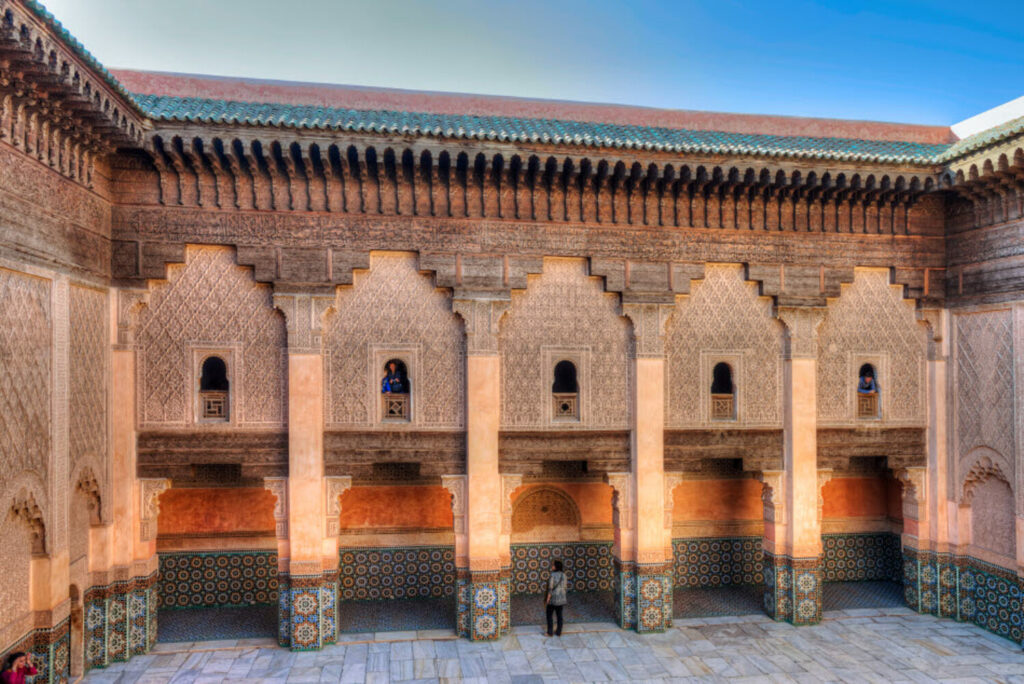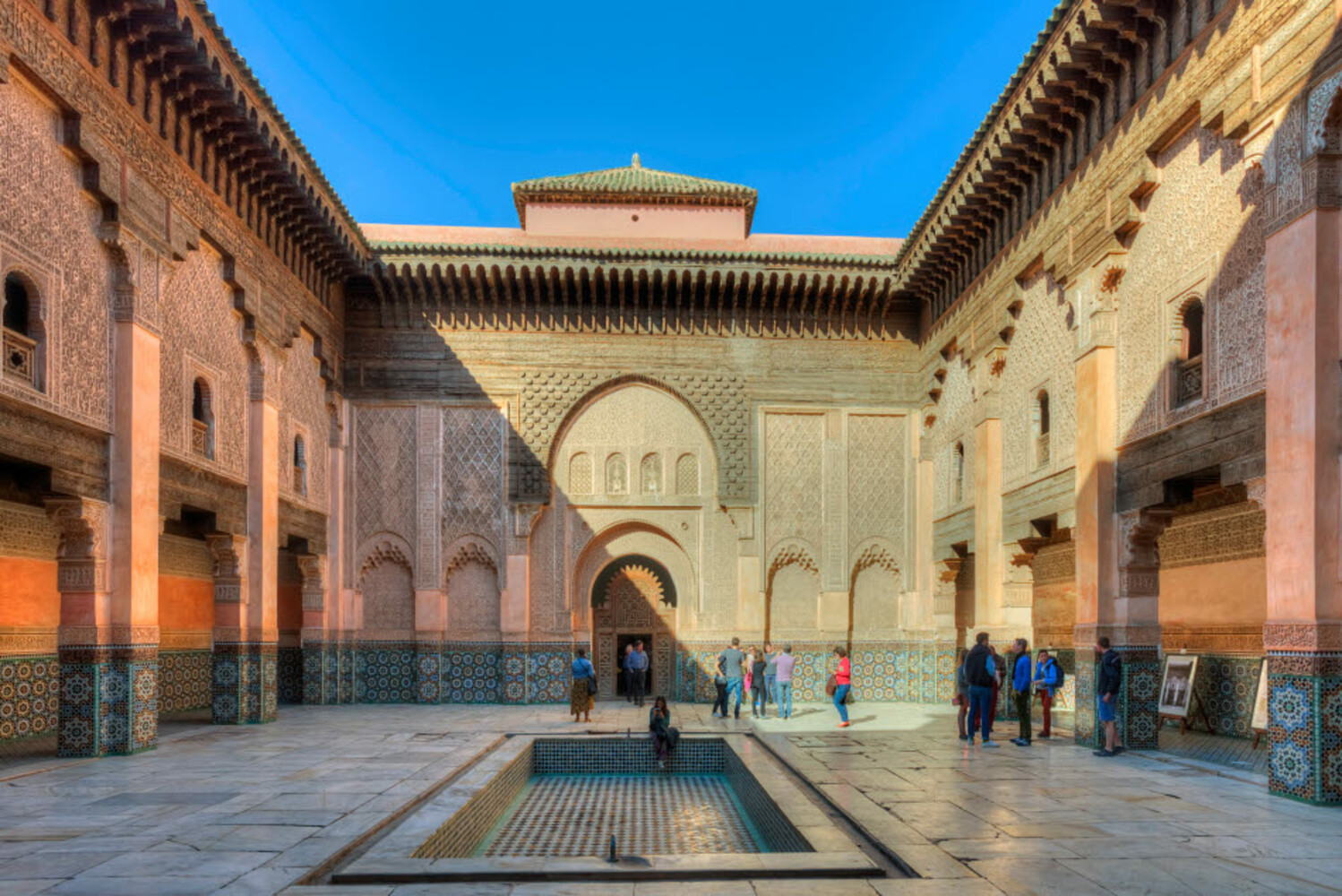Nestled within the ancient medina of Marrakech lies the Ben Youssef Madrasa, a mesmerizing architectural gem that serves as a testament to Morocco’s rich cultural heritage and Islamic scholarship. Dating back centuries, this historic institution continues to enchant visitors with its stunning beauty and spiritual significance.
Introduction to Ben Youssef Madrasa
The Ben Youssef Madrasa, also referred to as the Ibn Youssef Medersa, stands as a testament to Islamic scholarship, tracing its origins back to the 14th century. Established under the patronage of the Almoravid Sultan Ali ibn Yusuf, this venerable institution served as a prominent Islamic college in North Africa during its zenith. Its distinguished reputation drew scholars and students alike from various corners of the region, fostering an environment of rigorous theological study and intellectual discourse. Today, it stands as a cherished architectural gem, offering visitors a glimpse into the rich heritage of Islamic education and architectural excellence that characterized the medieval period in the region.
History and significance
Origins and construction
The Ben Youssef Madrasa, originating in the 14th century under the Marinid dynasty, stood as a beacon of Islamic learning. Initially conceived as an educational hub, it evolved over time through numerous expansions and renovations, each layer contributing to its architectural splendor. Through the centuries, it remained a bastion of scholarly pursuits, attracting students and academics from far and wide. Its intricate design, adorned with stunning mosaics, carved woodwork, and ornate calligraphy, reflects the exquisite craftsmanship of its era. The madrasa not only served as a place of education but also as a testament to the cultural and intellectual richness of its time.
Educational role
For centuries, the Ben Youssef Madrasa has been a cornerstone of Islamic education, shaping scholars and theologians whose impact reverberated throughout the region’s intellectual and cultural spheres. Its comprehensive curriculum covered theology, law, science, and literature, fostering a deep understanding of Islamic principles and fostering critical thinking among its students. The Madrasa stood as a testament to the rich tradition of learning in the Islamic world, attracting scholars from far and wide to study within its walls. Its influence extended beyond education, leaving an indelible mark on the development of Islamic thought and culture in the region, shaping the course of history for generations to come.
Architectural beauty

Design elements
The Ben Youssef Madrasa stands as a testament to exquisite Islamic architecture, renowned for its intricate detailing and mesmerizing design elements. Its walls and ceilings are adorned with mesmerizing tilework, intricately carved cedar wood, and captivating geometric patterns, showcasing the skilled craftsmanship of its creators. At the heart of the complex lies the central courtyard, a serene oasis boasting a marble fountain surrounded by ornate arches. Here, visitors are enveloped in a sense of tranquility, surrounded by the harmonious blend of artistic mastery and spiritual significance that permeates every corner of this historic institution.
Intricate decorations
Every corner of the Ben Youssef Madrasa is adorned with intricate decorations, from the vibrant mosaic tiles to the elaborately carved stucco plasterwork. These decorative elements not only showcase the skill and craftsmanship of Moroccan artisans but also reflect the spiritual significance of the madrasa.
Cultural importance
Influence on islamic scholarship
For centuries, the Ben Youssef Madrasa has stood as a bastion of Islamic knowledge and enlightenment, drawing seekers of wisdom from distant corners. Its rich heritage and educational prowess have not only influenced Morocco but also extended its impact globally. This venerable institution remains a cornerstone of Islamic academia, perpetuating centuries-old traditions and doctrines. Its profound teachings resonate through generations, nurturing a legacy of intellectual curiosity and spiritual growth. As a symbol of enduring scholarship, the Ben Youssef Madrasa stands as a testament to the timeless pursuit of knowledge, ensuring the preservation and dissemination of Islamic education for posterity.
Preservation efforts
In recent years, significant initiatives have been undertaken to safeguard the Ben Youssef Madrasa from ongoing deterioration. Supported by government bodies and global institutions, conservation endeavors have been launched with the dual purpose of reviving its architectural splendor and upholding its significance as a cherished cultural and historical icon. Through meticulous restoration efforts, crucial features of its design are being meticulously reinstated, ensuring its enduring legacy and relevance for future generations. These endeavors not only aim to preserve its physical integrity but also seek to celebrate its profound cultural heritage, thereby safeguarding a vital piece of history for posterity.
Visitor experience
Guided tours
At the Ben Youssef Madrasa, visitors embark on guided tours led by expert guides, delving into the intricacies of its halls, courtyards, and prayer rooms. These tours unravel the historical tapestry, architectural marvels, and cultural weight held within the madrasa’s walls. Through engaging narratives, visitors gain profound insights into its pivotal role in Islamic education, enriching their comprehension of its significance. As they traverse the labyrinthine corridors, they immerse themselves in the legacy and heritage preserved within, fostering a profound appreciation for the enduring influence of this esteemed institution. Each guided exploration promises an enlightening journey through time and culture.
Photography policy
Visitors to the Ben Youssef Madrasa are permitted to take photographs, provided they do so with respect and awareness of the site’s sanctity. However, certain guidelines must be followed to maintain the integrity of the delicate artwork and ensure an undisturbed experience for all. Flash photography and the use of tripods may be restricted in designated areas to safeguard the intricate features and prevent disturbances to fellow visitors. These measures aim to uphold the serenity and reverence of the Madrasa, allowing visitors to appreciate its beauty while honoring its cultural and religious significance.
Practical information
The Ben Youssef Madrasa is open to visitors daily, with entrance fees applicable for admission. It is advisable to check the opening hours and any special events or closures before planning your visit. Additionally, modest attire is recommended out of respect for the religious significance of the site.
Conclusion
The Ben Youssef Madrasa stands as a symbol of Marrakech’s spiritual and cultural heritage, offering visitors a glimpse into Morocco’s rich history of Islamic scholarship and education. With its stunning architecture, intricate decorations, and profound significance, it remains a must-visit destination for travelers seeking to immerse themselves in the spiritual heart of the city.
FAQs
- Is the Ben Youssef Madrasa still functioning as a school?
- No, the Ben Youssef Madrasa ceased functioning as an educational institution in the 20th century. Today, it serves primarily as a historical and cultural landmark.
- Are there any restrictions on visiting the Ben Youssef Madrasa?
- While visitors are welcome, there may be certain areas of the madrasa that are off-limits or restricted for preservation purposes. It’s essential to follow the guidance of staff and respect any signs or barriers in place.
- Can I attend prayers at the Ben Youssef Madrasa?
- The Ben Youssef Madrasa is primarily a historical site and does not typically host regular prayers. However, visitors may be able to witness occasional religious ceremonies or events during their visit.
- Is there a dress code for visiting the Ben Youssef Madrasa?
- While there is no strict dress code enforced, visitors are encouraged to dress modestly out of respect for the religious significance of the site. This may include covering shoulders and knees and avoiding revealing clothing.
- How long does it take to explore the Ben Youssef Madrasa?
- The time needed to explore the Ben Youssef Madrasa can vary depending on individual interests and the crowds. On average, visitors may spend around 1-2 hours exploring the complex and its various architectural features.



